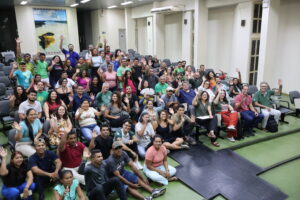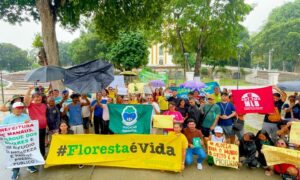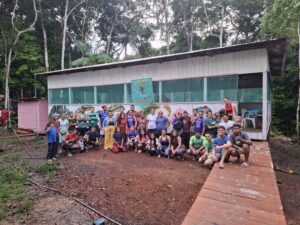Recently published article extols the relevance of local ecological knowledge of traditional communities in understanding the impacts of climate change in the Western Amazon
By Mariana Estevo
Climate change represents one of the greatest challenges to humanity and its impacts are already perceived throughout the planet. In the Amazon, due to the geographical extent and great cultural and biological diversity, the intensity and type of impacts of climate change on local livelihoods can vary considerably.
The climate-related changes that occur in the Amazon affect the socioecological systems present in this biome, with impacts on local livelihoods, which depend heavily on natural resources. These changes have the potential to directly affect the food and nutritional security of amazonian rural communities due to the impacts on the main subsistence activities such as fishing, cassava, açaí cultivation, ucuuba extractivism, muru-muru, andiroba, rubber, hunting, wildlife management, etc…
Through their long-term relationship with natural environments, rural communities have developed a detailed local ecological knowledge that they apply in the use and management of the region’s natural resources. Based on this knowledge, they also identify subtle ecological changes in these ecosystems where they live. This knowledge makes them important allies in understanding the effects of climate change and its consequences on subsistence activities that structure their ways of life.
In the study led by Mariana Estevo “Understanding Multidirectional Climate Change Impacts on Local Livelihoods through the Lens of Local Ecological Knowledge: A Study in Western Amazonia“, recently published in Society & Natural Resources , a group of researchers investigated the impacts of climate change on different subsistence activities in the Western Amazon, through the lens of local ecological knowledge of its inhabitants.

To this end, they conducted interviews with more than 400 residents from 24 communities spread over a stretch of more than 600 km of the Juruá river, and the main questions were: i) What are the main climate-related changes reported by local communities? ii) What are the subsistence activities most impacted by climate, particularly by extreme events, according to local communities? iii) How do impacts and extreme weather winds vary between subsistence activities and environments?
Residents reported a vast array of changes, many referring to changes in the atmospheric system (e.g., more summer rains), but with cascading effects on the physical, biological, and human systems. In addition to demonstrating the multiple and multi-directional impacts of climate change, the findings highlight the contribution of local ecological knowledge in identifying livelihood activities and value chains most vulnerable to climate change.


Graphs with results of the published work. b) Negative, neutral and positive effects of the impacts of changes on atmospheric system elements on different subsistence activities along the Mid-Juruá river. The bars indicate the percentage of observations associated with each subsistence activity that have negative, positive, or neutral impacts.; and c) Percentage of observations of changes in elements of the atmospheric system impacting different subsistence activities according to the perceptions of residents along the Mid-Juruá river.
The impacts are complex and can affect both negatively and positively the different activities. The production of muru-muru and andiroba for the extraction of vegetable oil, for example, which are important value chains in the region, are severely compromised by the great floods of the river. On the other hand, when this climate phenomenon occurs, the production of açaí and ucuuba, as well as fishing, are not impaired, and can even become more productive, being benefited during major floods.
The authors of the paper emphasize the importance of including local knowledge holders in the formulation of policies and strategies to mitigate the effects of climate change. They are people who have been historically relegated to decision-making spaces and, therefore, including them is a step towards greater social justice. In addition to having specific ecological knowledge, built by daily coexistence with the environment in which they live, which are an indispensable contribution in the development of policies to prevent and mitigate the impacts of climate change at different levels.






